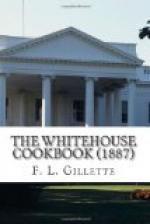Potatoes are injured by being frozen. Other vegetables are not the worse for it, provided they are always thawed in cold water.
TO KEEP MEAT FROM FLIES.
Put in sacks, with enough straw around it so the flies cannot reach through. Three-fourths of a yard of yard-wide muslin is the right size for the sack. Put a little straw in the bottom, then put in the ham and lay straw in all around it; tie it tightly and hang it in a cool, dry place. Be sure the straw is all around the meat, so the flies cannot reach through to deposit the eggs. (The sacking must be done early in the season before the fly appears.) Muslin lets the air in and is much better than paper. Thin muslin is as good as thick, and will last for years if washed when laid away when emptied.
National Stockman.
ROAST BEEF.
One very essential point in roasting beef is to have the oven well heated when the beef is first put in; this causes the pores to close up quickly, and prevents the escape of the juices.
Take a rib piece or loin roast of seven or eight pounds. Wipe it thoroughly all over with a clean wet towel. Lay it in a dripping-pan, and baste it well with butter or suet fat. Set it in the oven. Baste it frequently with its own drippings, which will make it brown and tender. When partly done season with salt and pepper, as it hardens any meat to salt it when raw, and draws out its juices, then dredge with sifted flour to give it a frothy appearance. It will take a roast of this size about two hours’ time to be properly done, leaving the inside a little rare or red—half an hour less would make the inside quite rare. Remove the beef to a heated dish, set where it will keep hot; then skim the drippings from all fat, add a tablespoonful of sifted flour, a little pepper and a teacupful of boiling water. Boil up once and serve hot in a gravy boat.
Some prefer the clear gravy without the thickening. Serve with mustard or grated horse-radish and vinegar.




